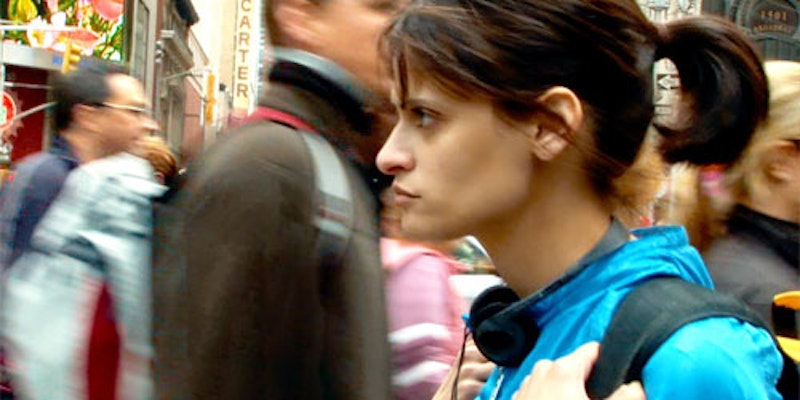It begins, as all waking nightmares must, in the wilds of New Jersey. A girl climbs off a bus, and meets a man who takes her to a hotel, where she waits pensively for her cell phone to ring. When it does, she must hang up immediately, then wait for another call, at which time a brusque, plain communiqué emanates. Eventually hooded men arrive to begin her indoctrination into the dark art of suicide bombing with a practiced calm that borders on chilling.
Welcome to the world of Day Night Day Night, a 2006 movie that doesn't so much ask the viewer to condone or accept political violence as it asks to invest in a nameless protagonist's (Luisa Williams, whose performance will melt your heart) fatal mission. We don't know why she's doing this willingly—she's clearly volunteered—anymore than we know what her handlers' revolutionary stake is. This movie is entirely devoid of polemics, subtle or overt, and is stronger for the choice.
Thus, the first half of the movie, set largely indoors, is a clinic on process: here she is bathing, brushing her teeth, modeling for her co-conspirators the right frocks for the mission, relentlessly rehearsing a sham identity, undergoing pre-deployment coaching, being fitted for a bulky yellow backpack containing nails and a bomb. For all the precautions taken to ensure she isn't a plant for law enforcement, there's something parental about the Underground Railroad-esque group guiding her toward her personal Ground Zero: an encouraging gentleness.
The magnetism of Williams cannot be understated. Her face is not especially expressive, but her eyes communicate, and she channels perfectly an eager-to-please 19-year-old Midwesterner who understands but doesn't totally comprehend what she's signed up for. In the first half of Day Night Day Night—call it the theoretical, or Ivory Tower half—she manages to maintain calm via the repetition of routine tasks and the nurturing encouragement of the group she's helping.
When she requests a pizza, she asks them to share it with her, and they comply. In the film's bleakest, most darkly comedic scene—where the group primps her for a "Goodbye" video, outfitting her in a ridiculous sub-Mao jacket, cradling an assault rifle at various angles, hair pinned up, then let down, then pinned back up—she keeps it together. There's a dry, purgatorial emptiness to these scenes, that reminded me, to various degrees, of Todd Solondz's deadpan comedies and early scenes in All Is Lost, which were heavily "process"-oriented; of an excellent, epic Haruki Murakami novel I'm deep into, 1Q84, where a female assassin takes on a delicate but essential assignment that will almost certainly a) require her to kill herself or b) change her identity, get plastic surgery, and start her life anew.
Then it's off to Times Square in NYC to detonate, which is when Day Night Day Night's pulse leaps straight down your throat. As anyone who's ever spent even a little time there without living there can attest, NYC is fucking exhausting: a no-quarter-given barrage of noise, sights, people, huge buildings everywhere, taxis scrambling. Director Julia Loktev's handheld camera trails and precedes our heroine—which is what she's earned the right to be considered, by this point—through this sensory overload. Theory gives way to uneasy practice, and the rest of the movie is a tone poem of eager tourism and a gunshyness so crippling that there's a very real possibility of the film's subject suffering a breakdown of some sort. There she goes, devouring mustard pretzels and candy apples double fisted, framed by a panoply of brightly colored candies, getting cruised by a belligerent b-boy, bumming quarters from strangers, repeatedly choking in her attempts to annihilate hordes of strangers. Look into those haunted, flashing eyes, drown in them, and feel the crushing loneliness come on in heedless, vicious waves.

